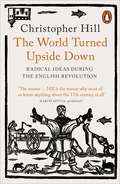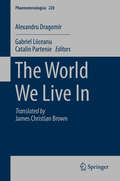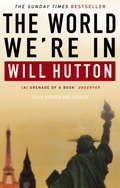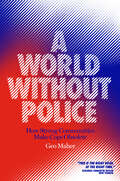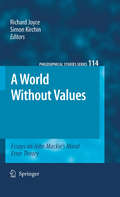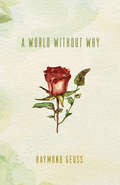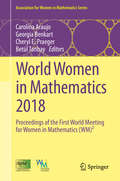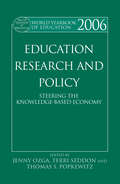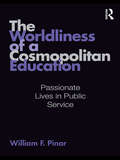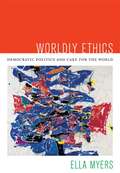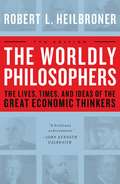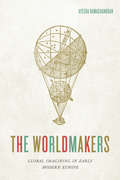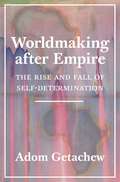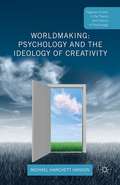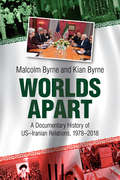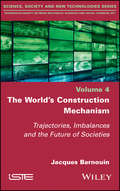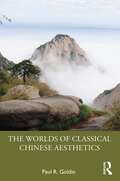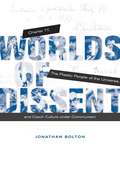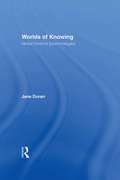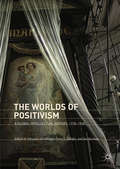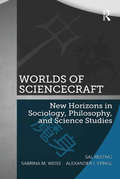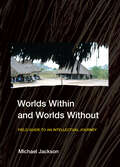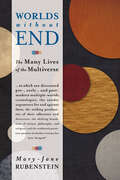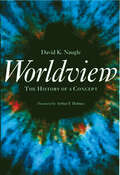- Table View
- List View
The World Turned Upside Down: Radical Ideas During the English Revolution
by Christopher Hill'His finest work and one that was both symptom and engine of the concept of "history from below" ... Here Levellers, Diggers, Ranters, Muggletonians, the early Quakers and others taking advantage of the collapse of censorship to bid for new kinds of freedom were given centre stage ... Hill lives on' Times Higher EducationIn 'The World Turned Upside Down' Christopher Hill studies the beliefs of such radical groups as the Diggers, the Ranters, the Levellers and others, and the social and emotional impulses that gave rise to them. The relations between rich and poor classes, the part played by wandering 'masterless' men, the outbursts of sexual freedom, the great imaginative creations of Milton and Bunyan - these and many other elements build up into a marvellously detailed and coherent portrait of this strange, sudden effusion of revolutionary beliefs.'Established the concept of an "English Revolution" every bit as significant and potentially as radical as its French and Russian equivalents' Daily Telegraph'Brilliant ... marvellous erudition and sympathy' David Caute, New Statesman'This book will outlive our time and will stand as a notable monument to the man, the committed radical scholar, and one of the finest historians of the age' The Times Literary Supplement'The dean and paragon of English historians' E.P. Thompson
The World We Live In
by Alexandru Dragomirgabriel Liiceanu Catalin PartenieThis book contains twelve engaging philosophical lectures, most of them given during Romania's Communist regime. They were written by Alexandru Dragomir, a former student of Heidegger who never published anything in his lifetime. The lectures deal with a diverse range of topics, such as the function of the question, self-deception in the past, the present, and the future, and banalities with a metaphysical dimension. The book includes a phenomenological discussion of the topic of nation and examines what happens when the human race loses its sense of measure. It also addresses the true role of the intellect in contrast with the dominance of scientific abstraction in today's technical world. Among the thinkers discussed are Anaxagoras, Socrates, Plato, Aristotle, Descartes, and Nietzsche. Alexandru Dragomir was born in 1916 in Romania. After studying law and philosophy at the University of Bucharest (1933-1939), he left Romania to study for a doctorate in philosophy in Freiburg, Germany, under Martin Heidegger. He stayed in Freiburg for two years (1941-1943), but before defending his dissertation he was called back to Romania for military service and sent to the front. After 1948, historical circumstances forced him to become a clandestine philosopher: he was known only within a very limited circle, and even his friends did not know whether or not he was giving concrete expression to his philosophical preoccupations in a written work. He died in 2002 without ever publishing anything. It was only after his death that the "Dragomir notebooks" came to light.
The World We're In
by Will HuttonTHE STATE WE'RE IN, Will Hutton's explosive analysis of British society, was the biggest selling politico-economic work since the Second World War. Now, as the world realigns itself in the wake of September 11, Hutton turns his attention to the global picture, and the ways in which the new world should be ordered.To understand the global economy, Hutton argues, one must first understand the United States where, over the past 30 years, the forces of conservatism have achieved such supremacy as to reduce liberalism to a term of abuse. The results have been dire: America is a weaker, fragmented society, and its economic strenths are oversold and misunderstood.But Britain and Europe are different: our attitudes towards property, equality, social solidarity and the public realm are strikingly distinct from Amerrica's current conservative leanings. Europe should not be afraid to stand up against the American version of globalisation, and champion the cause of a reinvigorated international society - taking over the mantle now abandoned by the US.
The World We're In
by Will HuttonA wake-up call to Britain, and the global economyTHE STATE WE'RE IN, Will Hutton's explosive analysis of British society, was the biggest selling politico-economic work since the Second World War. Now, as the world realigns itself in the wake of September 11, Hutton turns his attention to the global picture, and the ways in which the new world should be ordered.To understand the global economy, Hutton argues, one must first understand the United States where, over the past 30 years, the forces of conservatism have achieved such supremacy as to reduce liberalism to a term of abuse. The results have been dire: America is a weaker, fragmented society, and its economic strenths are oversold and misunderstood.But Britain and Europe are different: our attitudes towards property, equality, social solidarity and the public realm are strikingly distinct from Amerrica's current conservative leanings. Europe should not be afraid to stand up against the American version of globalisation, and champion the cause of a reinvigorated international society - taking over the mantle now abandoned by the US.
A World Without Police: How Strong Communities Make Cops Obsolete
by Geo MaherIf police are the problem, what’s the solution? <p><p> Tens of millions of people poured onto the streets for Black Lives Matter, bringing with them a wholly new idea of public safety, common security, and the delivery of justice, communicating that vision in the fiery vernacular of riot, rebellion, and protest. A World Without Police transcribes these new ideas—written in slogans and chants, over occupied bridges and hastily assembled barricades—into a compelling, must-read manifesto for police abolition. <p><p> Compellingly argued and lyrically charged, A World Without Police offers concrete strategies for confronting and breaking police power, as a first step toward building community alternatives that make the police obsolete. Surveying the post-protest landscape in Minneapolis, Philadelphia, Chicago, and Oakland, as well as the people who have experimented with policing alternatives at a mass scale in Latin America, Maher details the institutions we can count on to deliver security without the disorganizing interventions of cops: neighborhood response networks, community-based restorative justice practices, democratically organized self-defense projects, and well-resourced social services. <p><p> A World Without Police argues that abolition is not a distant dream or an unreachable horizon but an attainable reality. In communities around the world, we are beginning to glimpse a real, lasting justice in which we keep us safe.
A World Without Values: Essays on John Mackie's Moral Error Theory (Philosophical Studies Series #114)
by Richard Joyce Simon KirchinWhat kind of properties are moral qualities, such as rightness, badness, etc? Some ethicists doubt that there are any such properties; they maintain that thinking that something is morally wrong (for example) is comparable to thinking that something is a unicorn or a ghost. These "moral error theorists" argue that the world simply does not contain the kind of properties or objects necessary to render our moral judgments true. This radical form of moral skepticism was championed by the philosopher John Mackie (1917-1981). This anthology is a collection of philosophical essays critically examining Mackie's view.
A World without Why
by Raymond GeussWhy the human and natural world is not as intelligible to us as we think it isWishful thinking is a deeply ingrained human trait that has had a long-term distorting effect on ethical thinking. Many influential ethical views depend on the optimistic assumption that, despite appearances to the contrary, the human and natural world in which we live could, eventually, be made to make sense to us. In A World without Why, Raymond Geuss challenges this assumption.The essays in this collection—several of which are published here for the first time—explore the genesis and historical development of this optimistic configuration in ethical thought and the ways in which it has shown itself to be unfounded and misguided. Discussions of Greco-Roman antiquity and of the philosophies of Socrates, Plato, Hegel, Marx, Nietzsche, and Adorno play a central role in many of these essays. Geuss also ranges over such topics as the concepts of intelligibility, authority, democracy, and criticism; the role of lying in politics; architecture; the place of theology in ethics; tragedy and comedy; and the struggle between realism and our search for meaning.Characterized by Geuss's wide-ranging interests in literature, philosophy, and history, and by his political commitment and trenchant style, A World without Why raises fundamental questions about the viability not just of specific ethical concepts and theses, but of our most basic assumptions about what ethics could and must be.
World Women in Mathematics 2018: Proceedings of the First World Meeting for Women in Mathematics (WM)² (Association for Women in Mathematics Series #20)
by Carolina Araujo Georgia Benkart Cheryl E. Praeger Betül TanbayThe first World Meeting for Women in Mathematics - (WM)² - was a satellite event of the International Congress of Mathematicians (ICM) 2018 in Rio de Janeiro. With a focus on Latin America, the first (WM)² brought together mathematicians from all over the world to celebrate women mathematicians, and also to reflect on gender issues in mathematics, challenges, initiatives, and perspectives for the future. Its activities were complemented by a panel discussion organized by the Committee for Women in Mathematics (CWM) of the International Mathematical Union (IMU) inside the ICM 2018 entitled "The gender gap in mathematical and natural sciences from a historical perspective”.This historical proceedings book, organized by CWM in coordination with the Association for Women in Mathematics, records the first (WM)² and the CWM panel discussion at ICM 2018. The first part of the volume includes a report of activities with pictures of the first (WM)² and a tribute to Maryam Mirzakhani, the first woman to be awarded the Fields medal. It also comprises survey research papers from invited lecturers, which provide panoramic views of different fields in pure and applied mathematics. The second part of the book contains articles from the panelists of the CWM panel discussion, which consider the historical context of the gender gap in mathematics. It includes an analysis of women lecturers in the ICM since its inception. This book is dedicated to the memory of Maryam Mirzakhani.
World Yearbook of Education 2006: Education, Research and Policy: Steering the Knowledge-Based Economy (World Yearbook of Education)
by Thomas S. Popkewitz Terri SeddonThis volume considers the ways in which educational research is being shaped by policy across the globe. Policy effects on research are increasingly influential, as policies in and beyond education drive the formation of a knowledge-based economy by supporting increased international competitiveness through more effective, evidence-based interventions in schooling, education and training systems. What consequences does this increased steering have for research in education? How do transnational agencies make their influence felt on educational research? How do national systems and traditions of educational research - and relations with policy - respond to these new pressures? What effects does it have on the quality of research and on the freedom of researchers to pursue their own agendas? The 2006 volume of the World Yearbook of Education explores these issues, focusing on three key themes: globalising policy and research in education steering education research in national contexts global-local politics of education research. The 2006 volume has a truly global reach, incorporating transnational policy perspectives from the OECD and the European Commission, alongside national cases from across the world in contrasting contexts that include North and South America, Canada, France, Singapore, China, Russia and New Zealand. The range of contributions reflect how pervasive these developments are, how much is new in this situation and to what extent evidence-based policy pressures on research in education build on past relationships between education and policy. This book considers the impact of the steering processes on the work and identities of individual researchers and considers how research can be organised to play a more active role in the politics of the knowledge economy and learning society.
The Worldliness of a Cosmopolitan Education: Passionate Lives in Public Service (Studies in Curriculum Theory Series)
by William PinarPinar positions himself against three pressing problems of the profession: the crime of collectivism that identity politics commits, the devaluation of academic knowledge by the programmatic preoccupations of teacher education, and the effacement of educational experience by standardized testing. A cosmopolitan curriculum, Pinar argues, juxtaposes the abstract and the concrete, the collective and the individual: history and biography, politics and art, public service and private passion. Such a curriculum provides passages between the subjective and the social, and in so doing, engenders that worldliness a cosmopolitan education invites. Such worldliness is vividly discernible in the lives of three heroic individuals: Jane Addams (1860-1935), Laura Bragg (1881-1978), and Pier Paolo Pasolini (1922-1975). What these disparate individuals demonstrate is the centrality of subjectivity in the cultivation of cosmopolitanism. Subjectivity takes form in the world, and the world is itself reconstructed by subjectivity’s engagement with it. In this intriguing, thought-provoking, and nuanced work, Pinar outlines a cosmopolitan curriculum focused on passionate lives in public service, providing one set of answers to how the field accepts and attends to the inextricably interwoven relations among intellectual rigor, scholarly erudition, and intense but variegated engagement with the world.
Worldly Ethics: Democratic Politics and Care for the World
by Ella MyersWhat is the spirit that animates collective action? What is the ethos of democracy? Worldly Ethics offers a powerful and original response to these questions, arguing that associative democratic politics, in which citizens join together and struggle to shape shared conditions, requires a world-centered ethos. This distinctive ethos, Ella Myers shows, involves care for "worldly things," which are the common and contentious objects of concern around which democratic actors mobilize. In articulating the meaning of worldly ethics, she reveals the limits of previous modes of ethics, including Michel Foucault's therapeutic model, based on a "care of the self," and Emmanuel Levinas's charitable model, based on care for the Other. Myers contends that these approaches occlude the worldly character of political life and are therefore unlikely to inspire and support collective democratic activity. The alternative ethics she proposes is informed by Hannah Arendt's notion of amor mundi, or love of the world, and it focuses on the ways democratic actors align around issues, goals, or things in the world, practicing collaborative care for them. Myers sees worldly ethics as a resource that can inspire and motivate ordinary citizens to participate in democratic politics, and the book highlights civic organizations that already embody its principles.
The Worldly Philosophers
by Robert L. HeilbronerThe Worldly Philosophers is a bestselling classic that not only enables us to see more deeply into our history but helps us better understand our own times. In this seventh edition, Robert L. Heilbroner provides a new theme that connects thinkers as diverse as Adam Smith and Karl Marx. The theme is the common focus of their highly varied ideas -- namely, the search to understand how a capitalist society works. It is a focus never more needed than in this age of confusing economic headlines. In a bold new concluding chapter entitled "The End of the Worldly Philosophy?" Heilbroner reminds us that the word "end" refers to both the purpose and limits of economics. This chapter conveys a concern that today's increasingly "scientific" economics may overlook fundamental social and political issues that are central to economics. Thus, unlike its predecessors, this new edition provides not just an indispensable illumination of our past but a call to action for our future.
The Worldmakers: Global Imagining in Early Modern Europe
by Ayesha RamachandranIn this beautifully conceived book, Ayesha Ramachandran reconstructs the imaginative struggles of early modern artists, philosophers, and writers to make sense of something that we take for granted: the world, imagined as a whole. Once a new, exciting, and frightening concept, "the world" was transformed in the sixteenth and seventeenth centuries. But how could one envision something that no one had ever seen in its totality? The Worldmakers moves beyond histories of globalization to explore how "the world" itself--variously understood as an object of inquiry, a comprehensive category, and a system of order--was self-consciously shaped by human agents. Gathering an international cast of characters, from Dutch cartographers and French philosophers to Portuguese and English poets, Ramachandran describes a history of firsts: the first world atlas, the first global epic, the first modern attempt to develop a systematic natural philosophy--all part of an effort by early modern thinkers to capture "the world" on the page.
Worldmaking after Empire: The Rise and Fall of Self-Determination
by Adom GetachewDecolonization revolutionized the international order during the twentieth century. Yet standard histories that present the end of colonialism as an inevitable transition from a world of empires to one of nations—a world in which self-determination was synonymous with nation-building—obscure just how radical this change was. Drawing on the political thought of anticolonial intellectuals and statesmen such as Nnamdi Azikiwe, W.E.B Du Bois, George Padmore, Kwame Nkrumah, Eric Williams, Michael Manley, and Julius Nyerere, this important new account of decolonization reveals the full extent of their unprecedented ambition to remake not only nations but the world.Adom Getachew shows that African, African American, and Caribbean anticolonial nationalists were not solely or even primarily nation-builders. Responding to the experience of racialized sovereign inequality, dramatized by interwar Ethiopia and Liberia, Black Atlantic thinkers and politicians challenged international racial hierarchy and articulated alternative visions of worldmaking. Seeking to create an egalitarian postimperial world, they attempted to transcend legal, political, and economic hierarchies by securing a right to self-determination within the newly founded United Nations, constituting regional federations in Africa and the Caribbean, and creating the New International Economic Order.Using archival sources from Barbados, Trinidad, Ghana, Switzerland, and the United Kingdom, Worldmaking after Empire recasts the history of decolonization, reconsiders the failure of anticolonial nationalism, and offers a new perspective on debates about today’s international order.
Worldmaking: Psychology and the Ideology of Creativity (Palgrave Studies in the Theory and History of Psychology)
by Michael Hanchett HansonMichael Hanchett Hanson weaves together the history of the development of the psychological concepts of creativity with social constructivist views of power dynamics and pragmatic insights. He provides an engaging, thought-provoking analysis to interest anyone involved with creativity, from psychologists and educators to artists and philosophers.
Worlds Apart: A Documentary History of US–Iranian Relations, 1978–2018
by Malcolm Byrne Kian ByrneA relationship beset with extraordinary acrimony, the US and Iran rarely see eye-to-eye, if only to avoid war or nuclear catastrophe. What is at the core of this troubled rivalry that has stymied policymakers and scholars alike? Using a carefully selected collection of White House, CIA, State Department, and other records, Worlds Apart provides a comprehensive answer to this question: starting from the 1979 revolution and hostage crisis, through the Iran-Iraq War and the spread of radical Islam, to 9/11 and the nuclear impasse, to the 2009 Green Movement and the Obama and Trump presidencies. The records, which form the heart of the book, offer a rare, unfiltered view into the perspectives and experiences of the American and Iranian governments over 40 years. Providing timelines, glossaries, discussion questions, and a guide on reading declassified documents, Byrne and Byrne explore this complicated relationship accessibly and innovatively in this unique documentary history.
The World's Construction Mechanism: Trajectories, Imbalances, and the Future of Societies
by Jacques BarnouinThe interdisciplinarity between the biological and human sciences is here to serve a daring objective: to decipher, by means of a logical chain, the explanatory factors of human trajectories and imbalances between societies and nations. To do this, The World’s Construction Mechanism is based on an unprecedented analysis of the dynamics of the human species, combining the contributions of anthropology, archeology, biology, climatology, economics, geography, history and sociology. This book analyzes the roots of societal disharmony and presents ways of realizing a clear-sighted human project that is in step with the general interest of humanity.
The Worlds of Classical Chinese Aesthetics
by Paul R. GoldinThis book presents the foundations of classical Chinese aesthetic discourse - roughly from the Bronze Age to the early Middle Ages - with the following animating questions:What is art?Why do we produce it?How do we judge it?The arts that garnered the most theoretical attention during this time period were music, poetry, calligraphy, and painting, and this book considers the reasons why these four were privileged. Whereas modern artists most likely consider themselves musicians or poets or calligraphers or painters or sculptors or architects, the pre-modern authors who produced the literature that established Chinese aesthetics prided themselves on being wenren, “cultured people,” conversant with all forms of art and learning. Other comparisons with Western theories and works of art are presented at due junctures.Key Features Addresses Chinese aesthetic discourse on its own terms Provides comparisons of key concepts and theories with examples from Western sources Includes more coverage of primary sources than any other English-language book on the subject Each chapter opens with a helpful summary, highlighting the chapter’s key themes
Worlds of Dissent: Charter 77, The Plastic People of the Universe, and Czech Culture Under Communism
by Jonathan Bolton"Worlds of Dissent" analyzes the myths of Central European resistance popularized by Western journalists and historians, and replaces them with a picture of the struggle against state repression as the dissidents themselves understood, debated, and lived it. In the late 1970s, when Czech intellectuals, writers, and artists drafted Charter 77 and called on their government to respect human rights, they hesitated to name themselves "dissidents. " Their personal and political experiences-diverse, uncertain, nameless-have been obscured by victory narratives that portray them as larger-than-life heroes who defeated Communism in Czechoslovakia. Jonathan Bolton draws on diaries, letters, personal essays, and other first-person texts to analyze Czech dissent less as a political philosophy than as an everyday experience. Bolton considers not only Vaclav Havel but also a range of men and women writers who have received less attention in the West-including Ludvik Vaculik, whose 1980 diary "The Czech Dream Book" is a compelling portrait of dissident life. Bolton recovers the stories that dissidents told about themselves, and brings their dilemmas and decisions to life for contemporary readers. Dissidents often debated, and even doubted, their own influence as they confronted incommensurable choices and the messiness of real life. Portraying dissent as a human, imperfect phenomenon, Bolton frees the dissidents from the suffocating confines of moral absolutes. "Worlds of Dissent" offers a rare opportunity to understand the texture of dissent in a closed society.
Worlds of Knowing: Global Feminist Epistemologies
by Jane DuranJane Duran's Worlds of Knowing begins to fill an enormous gap in the literature of feminist epistemology: a wide-ranging, cross-cultural primer on worldviews and epistemologies of various cultures and their appropriations by indigenous feminist movements in those cultures. It is the much needed epistemological counterpart to work on cross-cultural feminist social and political philosophy. This project is absolutely breath-taking in scope, yet a manageable read for anyone with some background in feminist theory, history, or anthropology. Duran draws many comparisons and connections to Western philosophical and feminist ideas, yet avoids facile or imperialistic over-universalization. Her book is powerful, comprehensive, Pnd brave. It will prove an enormously useful resource for scholars in women's studies, philosophy, anthropology, religious studies and history.
The Worlds of Positivism: A Global Intellectual History, 1770-1930
by Jan Surman Johannes Feichtinger Franz L. FillaferThis book is the first to trace the origins and significance of positivism on a global scale. Taking their cues from Auguste Comte and John Stuart Mill, positivists pioneered a universal, experience-based culture of scientific inquiry for studying nature and society--a new science that would enlighten all of humankind. Positivists envisaged one world united by science, but their efforts spawned many. Uncovering these worlds of positivism, the volume ranges from India, the Ottoman Empire, and the Iberian Peninsula to Central Europe, Russia, and Brazil, examining positivism's impact as one of the most far-reaching intellectual movements of the modern world. Positivists reinvented science, claiming it to be distinct from and superior to the humanities. They predicated political governance on their refashioned science of society, and as political activists, they sought and often failed to reconcile their universalism with the values of multiculturalism. Providing a genealogy of scientific governance that is sorely needed in an age of post-truth politics, this volume breaks new ground in the fields of intellectual and global history, the history of science, and philosophy.
Worlds of ScienceCraft: New Horizons in Sociology, Philosophy, and Science Studies
by Sal Restivo Sabrina M. Weiss Alexander StinglA response to complex problems spanning disciplinary boundaries, Worlds of ScienceCraft offers bold new ways of conceptualizing ideas of science, sociology, and philosophy. Beginning with the historical foundations of civilization and progress, assumptions about the categories we use to talk about minds, identities, and bodies are challenged through case studies from mathematics, social cognition, and medical ethics. Offering innovative approaches to these issues, such as an integrated social brain-mind-body model and a critique of divisions between the natural and technological, this book provides novel conceptions of self, society and an emerging ’cyborg’ generation. From the micro level of brains and expanding all the way out to biopolitical civics, disciplinary boundaries are made permeable, emphasizing the increased need for interdisciplinary scholarship. By rejecting outdated and restrictive categories and classifications, new horizons in studies of science, technology, and medicine can be explored through the incorporation of feminist, international, and postmodern perspectives. A truly interdisciplinary examination of science and technology as cultural phenomena, Worlds of ScienceCraft will appeal to scholars and students of science and technology studies, as well as philosophers, historians, and sociologists of science, technology, and medicine.
Worlds Within and Worlds Without: Field Guide to an Intellectual Journey
by Michael JacksonAnthropologist Michael Jackson predicates his intellectual autobiography, Worlds Within and Worlds Without, on the view that works and lives are intimately entangled. Through a skillful interweaving of personal and ethnographic descriptions, he focuses on the imaginative and practical ways human beings negotiate the space between worlds they call their own and worlds they regard as lying beyond their immediate purview. Whether the worlds that elude our empirical grasp are identified with divinities or the dead, ether or earth, history or myth, the Internet, or the nation state, we experience them ambivalently, as potential sources of wellbeing and as possible threats to our very existence. Closing ourselves off from the world is not an option, for our humanity depends on the ties that bind us to significant others, and others to us. As Jackson shows, the relationship between the familiar and the foreign is not only an existential issue that all human beings address in one way or another. It is a methodological issue for anthropologists concerned with the complementarity of individual and collective perspectivesethnos and anthropos, the intrapsychic and the intersubjective.
Worlds without End: The Many Lives of the Multiverse
by Mary-Jane RubensteinA religion professor elucidates the theory of the multiverse, its history, and its reception in science, philosophy, religion, and literature.Multiverse cosmologies imagine our universe as just one of a vast number of others. Beginning with ancient Atomist and Stoic philosophies, Mary-Jane Rubenstein links contemporary models of the multiverse to their forerunners and explores the reasons for their recent appearance. One concerns the so-called fine-tuning of the universe: nature's constants are so delicately calibrated that it seems they have been set just right to allow life to emerge. For some thinkers, these "fine-tunings" are evidence of the existence of God; for others, however, and for most physicists, "God" is an insufficient scientific explanation. Hence the multiverse&’s allure: if all possible worlds exist somewhere, then like monkeys hammering out Shakespeare, one universe is bound to be suitable for life. Of course, this hypothesis replaces God with an equally baffling article of faith: the existence of universes beyond, before, or after our own, eternally generated yet forever inaccessible to observation or experiment. In their very efforts to sidestep metaphysics, theoretical physicists propose multiverse scenarios that collide with it and even produce counter-theological narratives. Far from invalidating multiverse hypotheses, Rubenstein argues, this interdisciplinary collision actually secures their scientific viability. We may therefore be witnessing a radical reconfiguration of physics, philosophy, and religion in the modern turn to the multiverse.&“Rubenstein&’s witty, thought-provoking history of philosophy and physics leaves one in awe of just how close Thomas Aquinas and American physicist Steven Weinberg are in spirit as they seek ultimate answers.&”—Publishers Weekly&“A fun, mind-stretching read, clear and enlightening.&”—San Francisco Book Review
Worldview: The History of a Concept
by David K. NaugleConceiving of Christianity as a "worldview" has been one of the most significant events in the church in the last 150 years. In this new book David Naugle provides the best discussion yet of the history and contemporary use of worldview as a totalizing approach to faith and life. This informative volume first locates the origin of worldview in the writings of Immanuel Kant and surveys the rapid proliferation of its use throughout the English-speaking world. Naugle then provides the first study ever undertaken of the insights of major Western philosophers on the subject of worldview and offers an original examination of the role this concept has played in the natural and social sciences. Finally, Naugle gives the concept biblical and theological grounding, exploring the unique ways that worldview has been used in the Evangelical, Orthodox, and Catholic traditions. This clear presentation of the concept of worldview will be valuable to a wide range of readers.
